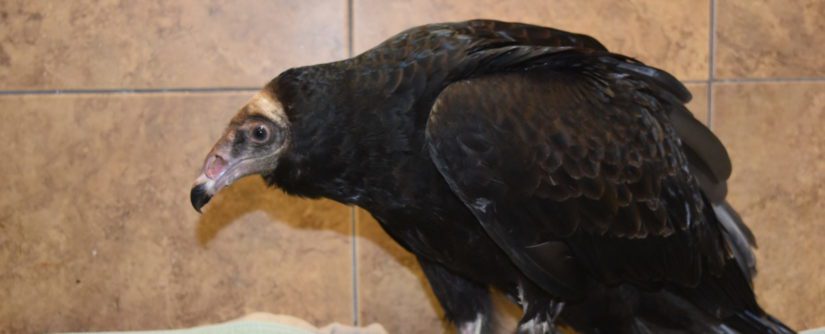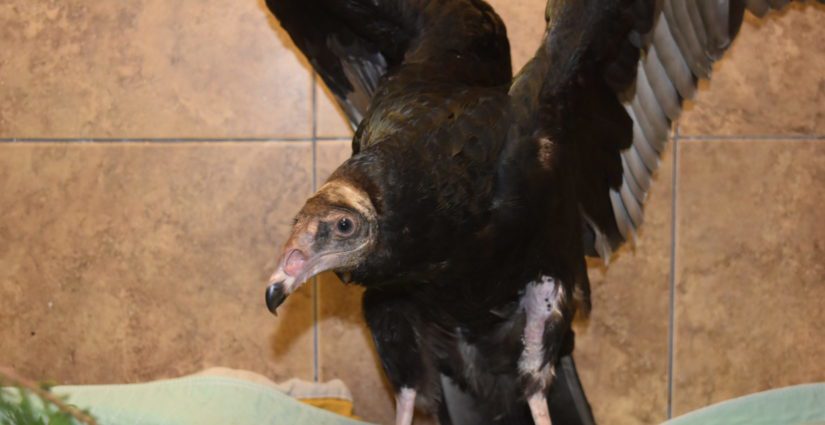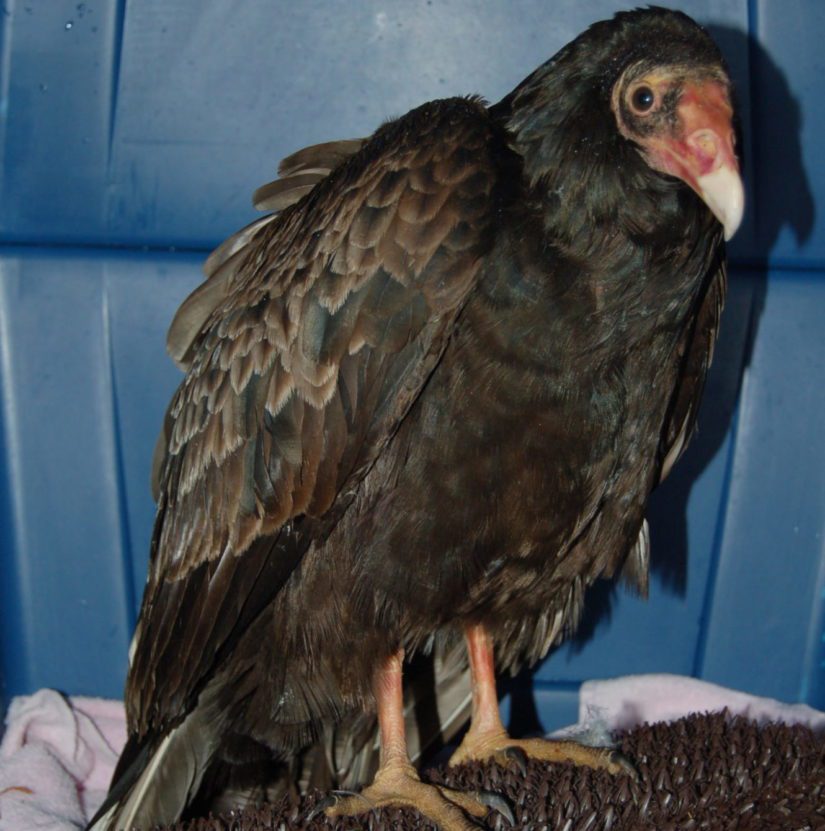While the snow came down in droves and people on the southern west coast of B.C. were hunkering down in their warm homes, avoiding driving on the perilous roads, Wild ARC staff were having one of their busiest days of the winter season. “We were receiving all kinds of calls about wildlife who were affected by the snow,” says Wild ARC assistant manager Meghan Hatch. “From hummingbirds who were having trouble coming out of torpor (a kind of mini hibernation they go into each night to conserve energy), to birds hitting windows, and animals hit by cars, it was difficult to coordinate the rescue of all these animals with the treacherous road conditions.” One patient in particular really highlighted the challenges faced by wildlife rehabilitation facilities in adverse weather conditions – a turkey vulture.

Wild ARC received a call about a turkey vulture only a few kilometers from the centre who was unable to fly and looked in poor condition. A raccoon who was recently deceased after being hit by a car had attracted the attention of a number of birds of prey who were taking advantage of the free meal. Unfortunately, with the remains of the raccoon being so close to the road, these incredible birds were also in danger of being hit by passing cars. “We suspect this turkey vulture was hit by a car, fell into a puddle of freezing cold water, and quickly became hypothermic,” says Hatch. “Wild ARC is usually dependent on a team of volunteer transport drivers to help get wild animals in need to our facility but we didn’t want to risk the safety of our volunteers on the snowy roads.” The finder of the bird was able to wrap her up in a coat while staff prepared a kennel and the Wild ARC truck to rescue the bird.
The turkey vulture was near critical on intake with severe dehydration and showing signs of shock and head trauma. She was given oxygen and quickly put in an incubator to warm up her freezing body. Staff provided her with fluids for rehydration and pain medication for her head trauma and injuries.

Turkey vultures have unique ways of dealing with predators in the wild but those methods can be detrimental to their rehabilitation. Turkey vultures often regurgitate when faced by a predator, which acts both as a deterrent for the predator and a means of reducing their body weight so they can quickly fly away. Since they consider humans to be predators, it can be difficult to ensure they receive enough nutrients in care because contact with staff can result in this regurgitating behaviour. “It’s a balance when caring for any wild animal” says Hatch, “staff need to ensure our wild patients receive a thorough exam and receive the proper care all while keeping contact with the animals to a bare minimum.”
Slowly but surely, this amazing turkey vulture was able to regulate her own body temperature, recover from the symptoms of her head injury and be ready for release. “Her release went beautifully!” said the Wild ARC rehabilitator who coordinated the release. “We found the perfect lookout near where she was found. She caught the air currents from the updraft right away and circled and circled in the air until she was a tiny dot in the distance.”
Fun facts about turkey vultures:
- Turkey vultures play an incredibly important role in the ecosystem: They are our cleanup crew from the skies, eating the decomposing flesh of deceased animals that other meat-eaters wouldn’t even consider. This is important because they dispose of carrion that would otherwise be a breeding ground for disease.
- They have an incredible sense of smell, which is unusual in most bird species. They are able to locate their food by smell, flying low to catch a whiff of decomposing animals in the air currents.
- Their sense of smell is beneficial to humans, too! Natural gas is odorless but companies add a substance called ethyl mercaptan to give the gas a smell so it can be detected by humans if there is a leak. Carrion also emit ethyl mercaptan and turkey vultures are attracted to that scent. Leaks in natural gas pipelines can been detected by watching for turkey vultures circling above the pipelines.
- Turkey vultures are masters of the air and migrate almost entirely by gliding. They use rising thermals to gain height in the sky and can take advantage of the slightest updraft to minimize the amount of flapping (and therefore energy) needed to travel long distances.
- The primary form of defense for a turkey vulture is regurgitating partially digested, foul smelling meat. Predators are deterred by the awful smell or, if they are close enough to have the vomit come in contact with their face or eyes, it can be very irritable. Regurgitating can also decrease the weight of the turkey vulture making it easier to fly away quickly from a predator.
- Turkey vultures defecate on their legs, which actually helps to cool them down and the uric acid in their poop kills off any bacteria they may have picked up from the decomposing flesh on which they feast.
Want to help us, help animals?
There are many ways to support our work in wild animal rehabilitation.

WildSense newsletter
Want to receive more stories like this, right in your inbox? Subscribe to WildSense, our bi-monthly wildlife newsletter.
